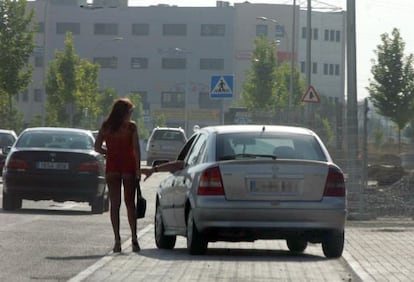Madrid to fine prostitute users, drug taxis and 15-M camp-out protestors
Begging outside shopping malls or selling Kleenex also to be banned under plans for new city bylaw

Soliciting the services of a prostitute on the street, begging for money outside a shopping mall and camping out in the Puerta del Sol like the 15-M protestors could all leave you liable to a fine of up to 750 euros as part of new plans to stamp out anti-social behavior on the streets of Madrid presented by the city council on Tuesday morning.
Selling packs of Kleenex at traffic lights, sleeping on public benches, feeding or washing dogs on the street, causing annoyance by watering plants, beating carpets on the sidewalk, jumping into fountains, as well as spitting, littering and juggling on public thoroughfares, would also all be covered by the new draft bylaw, which is aimed at “stopping disrespectful or conflictive habits on the street,” according to municipal social affairs chief Dolores Navarro.
The fines would be raised to up to 1,500 euros for racist, xenophobic, sexist or homophobic behavior; aggressive begging; offering to clean windshields at traffic lights; soliciting the services of prostitutes next to schools or shopping malls; reckless rollerblading or skateboarding; urinating or defecating in the street; not picking up after your dog; and breaking street furniture.
Fines of 3,000 euros would be reserved for discriminatory or bullying behavior towards minors, the elderly or the disabled; employing minors or the disabled for begging; promoting prostitution next to schools or exercising it in the street; operating so-called “drug taxis,” which take addicts to sales points outside the city center; and placing plant pots on window sills without sufficient protection to stop them falling.
Those offering to clean windshields at traffic lights and selling Kleenex will also be targeted
Some of the bans, such as those on public urinating and rug-beating, are already in force under other bylaws. “In Madrid we already had a large number of assorted rules, but there was a big gap when it came to the regulation of habits on the public highway, and a tool like this was necessary,” Navarro explained. “It will revoke obsolete regulations (such as the banning on raising hens or placing objects that block tramlines) [and] it will strengthen the authority of officers by giving them a clear and ordered law.”
The city council, which is governed by the conservative Popular Party, said the number of reported crimes was sure to increase under the new bylaw, but stressed that it had no interest in the additional revenue it would produce, nor would any more officers be made available to police the new regulation.
The punishments would be graduated according to criteria such as the seriousness of the action or the alarm it causes, the number of repeat offenses, and the economic means of the offender. In this way, light fines could reach 750 euros, but could also be as little as 90 cents, depending on the discretion of the judge dealing with the case.
The text has now been handed to the rest of the political groups in the city council — the Socialists, the United Left and the centrist UPyD — in order to try to reach an agreement on the bylaw ahead of its definitive approval by the full council, which is planned for January or February next year.







































